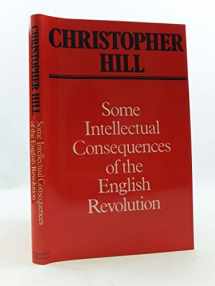
Some Intellectual Consequences of the English Revolution
ISBN-13:
9780297777809
ISBN-10:
0297777807
Edition:
First Edition
Author:
Christopher Hill
Publication date:
1980
Publisher:
University of Wisconsin Press
Format:
Hardcover
104 pages
FREE US shipping
Book details
ISBN-13:
9780297777809
ISBN-10:
0297777807
Edition:
First Edition
Author:
Christopher Hill
Publication date:
1980
Publisher:
University of Wisconsin Press
Format:
Hardcover
104 pages
Summary
Some Intellectual Consequences of the English Revolution (ISBN-13: 9780297777809 and ISBN-10: 0297777807), written by authors
Christopher Hill, was published by University of Wisconsin Press in 1980.
With an overall rating of 4.3 stars, it's a notable title among other
books. You can easily purchase or rent Some Intellectual Consequences of the English Revolution (Hardcover) from BooksRun,
along with many other new and used
books
and textbooks.
And, if you're looking to sell your copy, our current buyback offer is $0.34.
Description
In Some Intellectual Consequences of the English Revolution, Christopher Hill takes up themes that have emerged from a lifetime’s investigation into the causes of the English Revolution. However, Hill does more than analyze the origins of the Revolution. He examines the ways the seeds of change sown during the revolution, grew into transformative politics in the period following the restoration of the monarchy in 1660. Hill argues that the intellectual heritage of the English Revolution was mixed. While he acknowledges its achievements, he also depicts some of its failings. Consequently, he challenges the view that radical notions faded with the Restoration, suggesting instead, that they continued in pervasive and subtle ways throughout the course of English and American history. The apparent similarity between the England of 1640 and that of 1660 is shown to be illusory. Each period’s institutions survived but the social context had changed. In this way, Hill demonstrates how intellectual consequences cannot be separated from the social and economic factors of the nation that produced them. He concludes that historians should turn their attention to the “unofficial” radical heritage that is less easy to comprehend, though no less important. This is a highly readable and provocative account by one of the world’s foremost historians.


We would LOVE it if you could help us and other readers by reviewing the book
Book review

Congratulations! We have received your book review.
{user}
{createdAt}
by {truncated_author}


